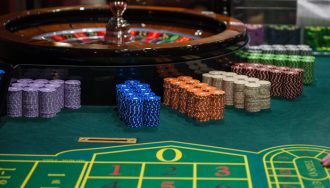A Complete Guide to Slot Machine Algorithms
 Gambler Playing Online Slot
Gambler Playing Online Slot
- Slot Machine Algorithm: An Overview
- Understanding Online Slot Machine Algorithms
- The Mechanism Behind Early Slot Machines
- Slot Machine Gaming: Ensuring Fairness
- Random Number Generator (RNG) Explained
- Crypto Gambling: Provably Fair Games
- Frequently Asked Questions
Slot machines are a staple in any land-based casino or online casino, and they’re loved by players for their simple rules, exciting gameplay, and the potential for big wins on each spin. While slot machines look pretty on the outside, behind the scenes, a vast amount is going on – and there’s a complex world of algorithms and mechanics that work together to make slot machines run.
In this post, we will look at online slot machine algorithms and slot machine random number generator mechanics – and show you how these both work to deliver a fair and random result.
Whether you’re an enthusiast looking to learn more or just curious about how these machines work, read on for an in-depth look at slot machine algorithms.
Slot Game Algorithm: An Overview
What is a slot game algorithm? That’s the question we’re going to answer in today’s blog. We will look at how slot machine calculation algorithm mechanics work and show you how slots evolved and how early mechanical slot machines worked.
Later, we will also look at the regulations and mathematics involved in ensuring fair, randomized outcomes in slots. To play slot machines online, you must play at a trustworthy, reliable casino. You should also choose a video slot from a reputable game developer. Check out the best online slot machines here.
Understanding Online Slot Machine Algorithms
Slot machine algorithms refer to the computer programs and mathematical formulas that determine the outcomes of modern slot machines. When a player presses the spin button on a slot machine, this triggers the game’s algorithm to run through a complex sequence of computations and random number generations to produce a final spin result.
These algorithms rely on a pseudo-random number generator (PRNG) function to ensure the results are sufficiently non-predictable and give the illusion of true randomness. The PRNG uses a starting ‘seed’ number that is continuously changed based on mathematical formulas and player inputs to generate a highly unique sequence of decimal numbers. This string of decimals maps to certain reel positions and thus determines the symbols that will land on the payline when the reels stop spinning.
In addition to computing spin results, slot machine algorithms control when bonuses and features land and when progressive jackpots are awarded. Usually, the algorithms control the frequency and payouts of these unique features by cycling through pre-programmed reward pools or using PRNGs to trigger features randomly.
Game developers spend significant time developing and testing these algorithms to guarantee acceptable levels of randomness and a targeted payback percentage for the casino. Government regulations also require independent auditing of slots to verify they meet randomness and fairness standards.
Of course, when you’re playing real money slots online, you can’t see anything – so you have to trust that the slot machine is fair. That’s why it’s so important to only play at reputable, legitimate online casinos. Doing so ensures you’ll be playing slot machines that have been thoroughly tested, audited, and verified for fairness.
The Mechanism Behind Early Slot Machines
So, while today’s computerized slot machines use algorithms, how did older mechanical slots work? Well, original slot machines were entirely mechanical, operating using physical reels, gears, levers, and springs. The reels featured symbols like card suits, horseshoes, and bells painted on wooden or metal strips. Players would insert a nickel and pull a side lever to spin the reels, hoping to land on a winning symbol combination across the payline.
These early machines relied on intricate mechanisms to randomize the spins. The reels were not fixed in place but free spinning, with variably spaced stops or detents around the outside. When a spin was played, the mechanical parts would cause the reels to spin independently before randomly stopping. Additional mechanisms like kickers – small pegs that bounced the reels – added more unpredictability to the game.
The mechanical parts that powered the reels were hidden inside the machine itself, so players weren’t usually able to see them. Gears connected to the lever pull arm would engage the reels via metal driveshafts. Clockwork mechanisms like springs and flat metal bands also acted like braking systems to help stop the reels quickly. Operators and owners of the machines could adjust the gear positions to change the games’ payout percentages.
Once the reels stopped, the slot would detect wins by a simple mechanical matching system. Symbols had to line up precisely across the payline painted on the glass plate. No electronics were involved – and it’s pretty impressive how these older slot machines worked in the pre-technology era.
If a winning combination occurred, the payout was completely automated, too. Coins were stored inside the slot, and hoppers automatically held and dispensed each coin denomination when a winning combination or spin was hit.
While they were advanced at the time, cheaters soon found ways to manipulate machines – and that’s the main reason why you don’t see mechanical slot machines offered in many land-based casinos today.
Slot Machine Gaming: Ensuring Fairness
Modern slot machines rely on the fairness of their algorithms to ensure players have a randomized gaming experience with advertised odds. Regulators and independent labs rigorously test the randomness and payback percentages before casinos can deploy slot machines.
Random Number Generators (RNGs) are the core algorithms determining spin outcomes. RNGs are evaluated using mathematical tests to analyze their output sequences. While it’s impossible for any computer-generated string or output to be 100% random, random number generators are tested billions of times to ensure they don’t have any predictable patterns or non-randomness – to the best of today’s technology. One of the most common random number generators today is the Mersenne Twister model.
Payout percentages (more commonly known as the RTPs) are also extensively tested by simulating billions of potential spins. Several certified testing houses (labs) are responsible for testing both the random number generators and the RTPs – and game developers must provide them with their games’ source code so they can look at everything. Below, we’ll examine a few of the most common testing houses.
| Testing House | Description |
|---|---|
| eCOGRA (eCommerce Online Gaming Regulation and Assurance) | eCOGRA is a UK-based, internationally approved testing agency certifying online gaming software and systems. They ensure that online casinos operate fairly and transparently, protecting players’ interests. |
| GLI (Gaming Laboratories International) | GLI is a global leader in providing the gaming industry with independent testing, inspection, and certification services. They work with regulators, suppliers, and operators to ensure the integrity of gaming products. |
| TST (Technical Systems Testing) | TST is a part of GLI and is known for its rigorous testing of online casino games, including Random Number Generator (RNG) verification. They help in maintaining the credibility and fairness of online gaming platforms. |
| iTech Labs | iTech Labs is an ISO/IEC-certified testing laboratory that offers quality assurance testing of online gaming systems. They focus on compliance with various jurisdictional requirements, ensuring that games are fair, reliable, and meet the necessary standards. |
Once a testing house has tested and approved a slot, it can be offered to players. Casinos must also connect their slot statistics to central monitoring systems in most jurisdictions. Gaming regulators can then monitor them and quickly identify any discrepancies or abnormalities.
While no computer algorithm can be 100% certified as genuinely random, today’s technology means slot machines are more than random enough – and the layers of mathematical, statistical, and cryptographic testing ensure that casinos cannot cheat players.
Random Number Generators (RNG) Explained
Throughout this blog about online slot game algorithms, you’ll have noticed we’ve talked about random number generators quite a lot. But what are random number generators? In short, they’re algorithmic formulas that churn out intricate sequences of numbers. They act as the modern replacement for the mechanical randomness of old slot machines. RNGs use mathematical operations on an initial numeric seed value to produce billions of unpredictable results.
Common RNGs include linear congruential generators and Mersenne Twister algorithms. It’s incredibly complicated technology – but essentially, a seed value is chosen each time a player presses the spin button, and this seed constantly changes based on factors like elapsed microseconds from the system clock.
Crypto Gambling: Provably Fair Games
Provably fair casino games run on relatively new technology, although, already, they’re revolutionizing the online gambling industry, allowing players to verify game fairness on crypto-powered slot and dice games. Instead of relying on blind trust, provably fair games work by disclosing the RNG seed values to players along with the cryptographic steps used to generate the random outcomes.
Players can check these values against hashed seeds on the public blockchain to mathematically prove the game isn’t rigged. For example, if a dice roll lands on 3, the player can match it to the disclosed seed value and verify that it hashes to the correct randomized number.
In the past, one of the main problems with virtual casino games was that players simply had no way of verifying the randomness of the results themselves. Sure, the testing houses are accredited and legit – but many players still had their doubts over the true randomness. Provably fair games eliminate this, as players can verify the result of every spin/hand with 100% certainty.




